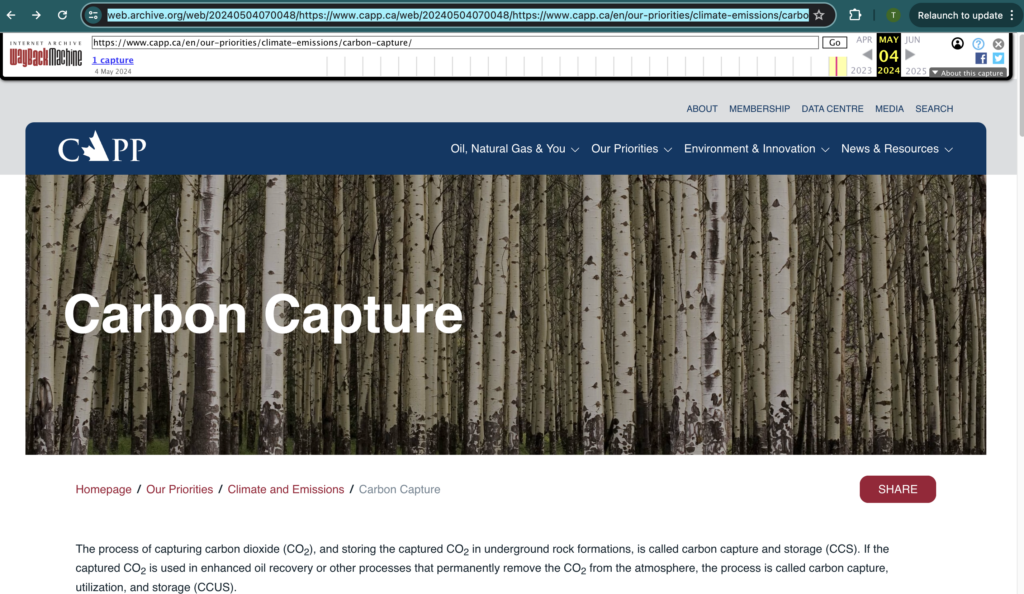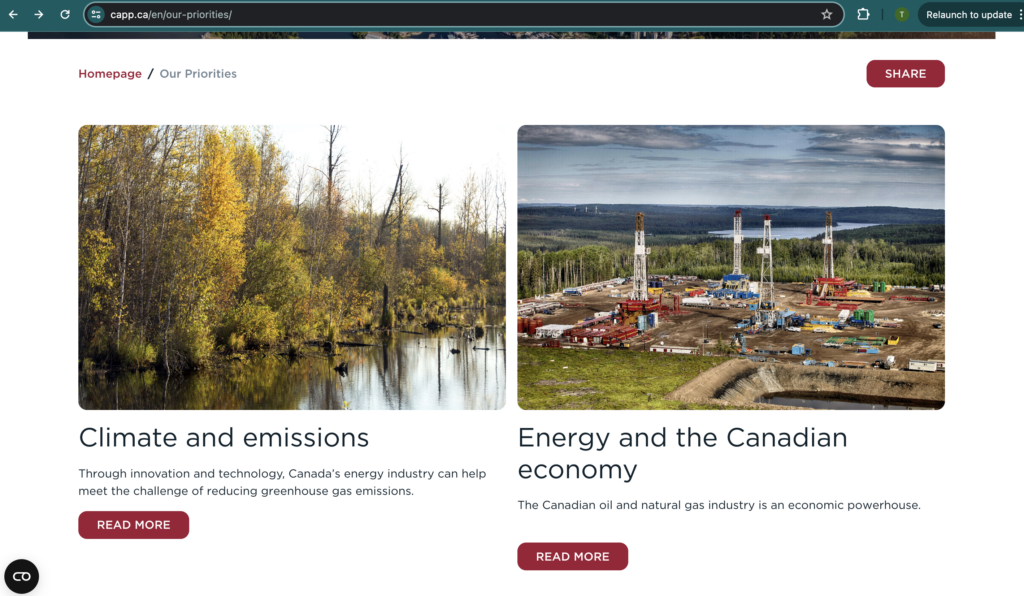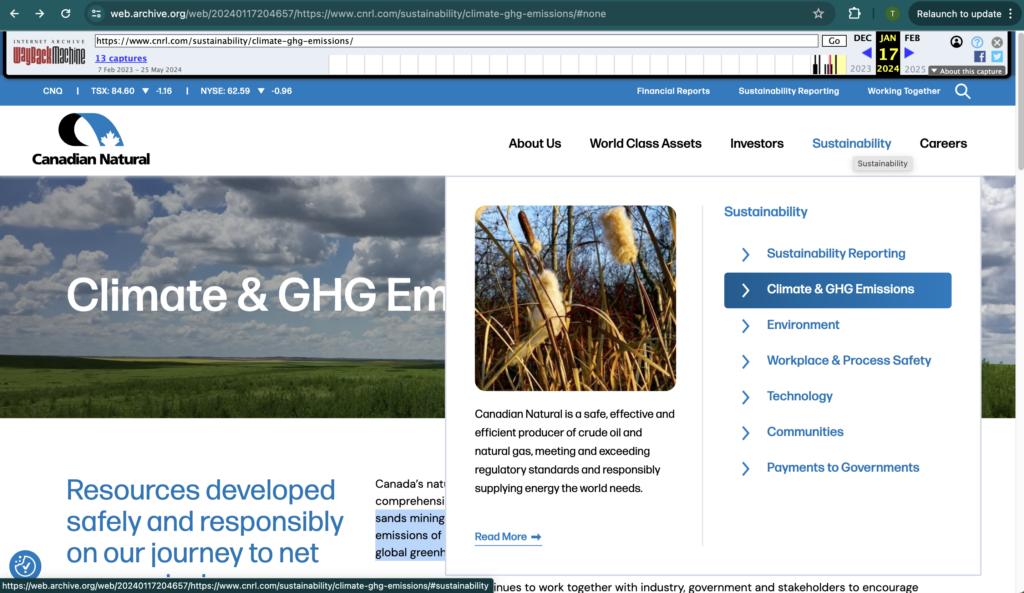Canadian oil companies, fossil fuel lobby groups, and third-party advertisers are scrubbing their websites of content related to carbon capture and storage in the wake of new legal greenwashing guidelines.
DeSmog recently reported that a coalition of Canadian tar sands producers — the Pathways Alliance — had scrubbed its website of all content on June 19, in anticipation of changes to Canada’s Competition Act. The amendments require any organization making claims about the potential environmental benefits of their product, service, or project to provide evidence of those claims.
Under the new amendments, companies found to be misleading the public with false environmental claims could be fined up to $10 million.
Subscribe to our newsletter
Stay up to date with DeSmog news and alerts
Pathways Alliance had been proposing a massive carbon capture and storage (CCS) project in Alberta as its principal climate change mitigation strategy. Over the past year, the organization has engaged in a national media blitz promoting its project — including advertising on buses, trams, rental bikes, and bus shelters in Vancouver, Toronto, and Montreal. This advertising campaign used slogans such as “The path to net zero begins with carbon capture and storage” – statements that Canadian environmental groups took issue with as they could be considered misleading or deceptive.
Emilia Belliveau, Energy Transition program manager with advocacy group Environmental Defence, said in a statement that Pathways Alliance’s action to scrub its website suggests that “they don’t have evidence to support the story they’re selling on carbon capture, and that its member companies’ business plans don’t align with a net-zero future.”
“It’s clear that rules to rein in greenwashing are needed, and that C-59 is doing its job effectively if organizations like the Pathways Alliance are scrambling to take down their unsubstantiated environmental claims and rethinking their misleading advertising plans,” she added, referring to the bill number of the Competition Act amendments.

In the days since the Pathways Alliance deleted its CCS content, the Canadian Association of Petroleum Producers (CAPP) has followed suit, not only entirely removing its website’s section on carbon capture, but also removing its section on climate and emissions as well.

DeSmog has previously reported on deceptive or misleading statements issued by CAPP. In September 2023, CAPP released a report indicating more oil production wouldn’t increase emissions. But the report failed to include emissions from what they termed “unconventional oil production” — meaning the tar sands, which account for two-thirds of Canadian oil production. At the time, CAPP explained to DeSmog that, because they claim to only represent conventional producers, they included only conventional production in its analysis. In fact, nearly all of Canada’s “conventional producers” are also tar sands producers.
Canada Action, a third-party political advertiser that has been running a campaign advocating for the Canadian oil and gas sector, also removed content and phrasing related to their claims about the environmental benefits of LNG. Since at least the autumn of 2023, the organization has been running an advertising campaign in several Canadian cities, including Canada’s capital city, Ottawa, with statements reading “Canadian LNG Exports Will Reduce Global Emissions.” The ads appeared across the city on transit and in public buildings such as hockey arenas. They also ran at the same time as CAPP-sponsored pro-oil industry ads, and anti-carbon tax ads placed by the Canadian Taxpayers Federation, a libertarian anti-tax group with ties to the Atlas Network and the oil industry. In May, Canada’s ad council found these ads to be misleading. DeSmog recently discovered that Canada Action had removed the phrase “Canada continues to make progress on renewable energy production” from its website.

Canadian Natural Resources Limited (CNRL), a tar sands producer and member of the Pathways Alliance, removed two sections from its website, listed under “environment” and “climate and GHG emissions.” Text from the latter section, found on the Internet Archive, stated:
Resources developed safely and responsibly on our journey to net zero emissions.
And then went on to say:
Canada’s significant long life, no decline oil sands mining resources with manufacturing-like operations represent one of the clearest routes to net zero emissions of any global crude oil asset, making them valuable for sustainable long-term energy security and global greenhouse gas (GHG) reductions.
The section also included information about the company’s efforts at reducing greenhouse gas emissions and protecting air quality. Prior to altering its environmental claims, the company further boasted that it met or exceeded regulatory standards. CNRL deleted company information on protecting water quality, land management, and its environmental planning and monitoring.

In addition, CNRL deleted every page on its website that previously mentioned “carbon capture.”
In a Google search for “carbon capture” and Canadian oil producer Cenovus, DeSmog found a page titled “Innovation: The gateway to sustainable advancements” as the first search result, but now it leads to a 404 error page. According to the Internet Archive, the page once included information about how carbon capture technology would reduce greenhouse gas emissions.
DeSmog found more than 70 distinct URLs linked to tar sands producers (who are members of the Pathways Alliance), or web pages hosted by CAPP, that mention carbon capture or CCS that have now been removed. Roughly 40 pages mentioning carbon capture were removed from the Imperial Oil website alone.
Imperial Oil – the Canadian subsidiary of Exxon – removed statements attributed to their CEO stating the carbon capture was critical to meeting Paris Agreement climate goals, as DeSmog reported last week. Imperial had been researching carbon capture for decades as a climate change solution, but apparently did not have the proof necessary to buttress its claims. Still-active pages from Imperial’s website relating to carbon capture now indicate the information is only for “historical information and reference purposes.”
Carbon capture projects have consistently under-delivered on promises of capturing and storing carbon, and have almost exclusively been used to increase oil production. There are considerable risks to CCS projects — such as mass carbon dioxide poisoning — in addition to the fact that carbon capture is a heavily subsidized, inefficient, and largely unproven method of decarbonization.
International Energy Agency Executive Director Fatih Birol has described the widespread deployment of carbon capture technology to cut emissions as “fantasy.”
Mixed Messages
A recent report by nonprofit think tank InfluenceMap reveals that, despite positioning itself as climate-conscious and committed to carbon capture, Pathways Alliance members have given the Canadian government contradictory messages on the technology, emphasizing uncertainty surrounding its effectiveness. InfluenceMap has argued Pathways is using its mass media image as cover for tar sands producers to delay and weaken climate policy.
In a statement to DeSmog, Mark Z. Jacobson, director of the Atmosphere/Energy Program at Stanford University and critic of carbon capture technology, summarized the technology’s problems:
“The problem is not a shortage of places to store CO2. The problems are the energy required to capture the CO2; building, installing, and operating the pipelines required to transport the CO2; the increased mining that occurs to provide the energy; the increased air pollution that occurs to provide the energy; and the opportunity cost lost due to not using the energy needed to capture CO2 to instead replace a fossil-fuel source.”
Subscribe to our newsletter
Stay up to date with DeSmog news and alerts







